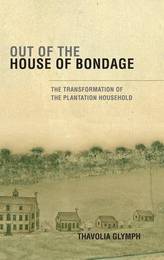
|
Out of the House of Bondage: The Transformation of the Plantation Household
Hardback
Main Details
| Title |
Out of the House of Bondage: The Transformation of the Plantation Household
|
| Authors and Contributors |
By (author) Thavolia Glymph
|
| Physical Properties |
| Format:Hardback | | Pages:294 | | Dimensions(mm): Height 231,Width 163 |
|
| ISBN/Barcode |
9780521879019
|
| Classifications | Dewey:307.720820975 |
|---|
| Audience | | Professional & Vocational | |
|---|
|
Publishing Details |
| Publisher |
Cambridge University Press
|
| Imprint |
Cambridge University Press
|
| Publication Date |
30 June 2003 |
| Publication Country |
United Kingdom
|
Description
The plantation household was, first and foremost, a site of production. This fundamental fact has generally been overshadowed by popular and scholarly images of the plantation household as the source of slavery's redeeming qualities, where 'gentle' mistresses ministered to 'loyal' slaves. This book recounts a very different story. The very notion of a private sphere, as divorced from the immoral excesses of chattel slavery as from the amoral logic of market laws, functioned to conceal from public scrutiny the day-to-day struggles between enslaved women and their mistresses, subsumed within a logic of patriarchy. One of emancipation's unsung consequences was precisely the exposure to public view of the unbridgeable social distance between the women on whose labor the plantation household relied and the women who employed them. This is a story of race and gender, nation and citizenship, freedom and bondage in the nineteenth century South; a big abstract story that is composed of equally big personal stories.
Author Biography
Thavolia Glymph (Ph.D. Economic History, Purdue University) is an Assistant Professor of African and African American Studies and History at Duke University. She has co-edited two volumes of the award-winning Freedom: A Documentary History of Emancipation series and published scholarly articles in five book collections. Glymph's far-ranging experience as a scholar and educator extends to various teaching appointments and museum projects. Her current work focuses on a comparative study of plantation households in Brazil and the U.S. South, Civil War soldiers in Egypt after the Civil War, and a history of women in the Civil War.
Reviews"The intellectually sophisticated and analytically acute Thavolia Glymph compels serious reconsideration of the transition in the relations of southern black and white women. Sensitive to the painful circumstances of both, she illuminates the political dimension of their daily interaction." -Eugene D. Genovese, author of Roll, Jordan, Roll and Mind of the Mater Class, with Elizabeth Fox-Genovese, Cambridge University Press, 2005 "Combining the tools of an economic and social historian with a flair for robust cross-examination of historical sources, Thavolia Glymph has fashioned a study of women in the plantation household into a sweeping reinterpretation of the post-slavery South." -Barbara J. Fields, Columbia University "Professor Glymph makes a powerful argument about relationships between black and white women in the slaveholding South. She explores the systematic, often brutal, use of violence by women of the planter elite against enslaved women and demolishes the idea that some form of gender solidarity trumped race and class in plantation households. This important book should find an appreciative audience among readers interested in African American, southern, women's, and Civil War-era history." -Gary W. Gallagher, John L. Nau III Professor of History, University of Virginia
|